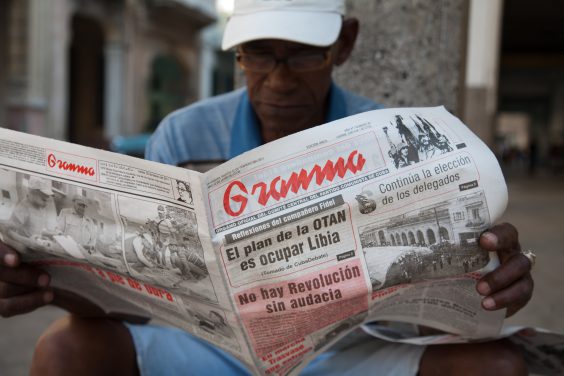The Rules of the Debacle, or a Matter of Despotism
by Orlando Luis Pardo Lazo translated by Alex Higson / June 10, 2016 / No comments

A man reading Granma, the official newspaper of the Communist Party of Cuba. Image by Jorge Royan via Wikimedia Commons.
The Castro regime has established two “rules of debate” that are not meant to be debated.
Castroist Cuba always promises each new generation of artists, activists, writers, and journalists more space for participation. Now, as Castroism draws closer to the United States and Europe in search of lending, investment, and a legitimizing image for the oldest dictatorship on the planet, the regime has promised the Cuban people a democratization of the debate, meaning that every citizen will finally be able to influence our nation’s fate.

- Is it worth-while to focus on the last images and letters coming from the inside of the last living utopia on Earth? Is Cuba by now a contemporary country or just another old-fashioned delusion in the middle of Nowhere-America? A Cold-War Northtalgia maybe? Can we expect a young Rewwwolution.cu within that Ancien Régime still known as The Revolution? I would like to provoke more questions than answers.

- Orlando Luis Pardo Lazo was born in Havana City and still resides and resists there, working as a free-lance writer, photographer and blogger. He is the author of Boring Home (2009) and is the editor of the independent opinion and literary e-zine Voces.
The planned mass debates, coordinated by “community-based organizations,” seem to be virtually obligatory, and they will almost always take place just before or after the congress of the only legal political party in Cuba. And that is precisely what is happening in 2016.
Not long after the close of the Seventh Congress of the Cuban Communist Party in April, Granma, the official newspaper of the Communist Party (of course, any section of the Cuban press that is not state-run is illegal) published the “Rules of the Debate, or a Matter of Principles,” in an article by Rafael Cruz Ramos.
More than just an editorial piece, the article comes across as a sort of despotic edict, which the international media has parroted. However, it will mean very little to your average Cuban, who will know what it comes down to before even reading it: another tired totalitarian trick, a tongue twister designed to buy some time and thereby guarantee the dynastic succession of the second- and third-generation Castros in 2018.
The text speaks for itself. It describes “a battle for power,” a battle for the principles “of socialism against the principles of capitalism.”
The unquestionable character of Cuba’s single-party system, with its consequent burden of intellectual censorship and citizen exclusion, will be imposed by force on the island forevermore. It will be imposed just the same on those in exile, who are still victims of an atrocious migratory apartheid, unable to live permanently in their own homeland and equally unable to exercise their basic rights in their host countries.
Nonetheless, the Granma reporter’s cynicism has two jewels to offer. The Communist elite has defined two “rules of the debate” that cannot be debated.
Rule number one of the debate: as General Raúl Castro stated at the Cuban Communist Party congress, “the irrevocable character of the political and social system affirmed in today’s Constitution, including the commanding role of the Cuban Communist Party in our society,” is not up for debate.
Cruz Ramos rules that anyone who wonders “why not capitalism?” is either “naive or sly.” Nothing and no one can be allowed to “destroy the socialist framework that is under construction and reinstate the antiquated, worn-out capitalist system.” What Cruz Ramos fails to consider is that perhaps the Cuban people would prefer to deconstruct that worn-out, decaying socialist framework and create an efficient free-market model with guaranteed fundamental rights.
Rule number two of the debate: the debate is closed to “anyone who is financed, endorsed, or supported by anti-Cuban terrorist funds from Miami [i.e., the United States] or any other country, including the countries of old [Western] Europe,” because this would be “the same as assassinating Che Guevara each morning, blowing up La Coubre again, killing the teachers and educators, and making the Barbados plane disappear each day. There is no point accusing us of being intolerant, of being stuck in the past, or some other catcall. Too much blood has been spilled, too many tears, too much pain, for us to forget.”
That is to say, the past is the future. And today is ever always, for the Castros of the Castros until the end of time. Wave goodbye to any attempt at reconciliation. And forget the small matter of the hundreds or thousands of activists and artists who are critical of the regime and for years have been forced to depend on foreign nations for their survival. They cannot make a living in their own country when censorship will not allow them to comment, to expose, or to market their work on the island.
With a touch of the apocalyptic—apocubalyptic—Cruz Ramos describes for us the debacle of his violent vision: “elderly people without social security, students in debt, jobless teachers, newborn babies dying in droves, assets liquidated, anti-riot police training to torture, parties and politicians taking turns in power to do more of the same, gangs of youths killing each other, senators with bank accounts in fiscal havens, drug dealers paid from State budgets, It girls, commercial propaganda, high school dances.”
His view, in short, is that a democratic Cuba would have no other option but to become another piece of Latin American carrion: from idols to indios. If we were given our freedom, we Cubans would lose the revolutionary aura that makes us exceptional, unique, and uncontaminated as a people, in continental and even universal history: fascism made by Fidel. If we were given our freedom, Cruz Ramos’ monologue would be unthinkable and Granma would have to publish a letter to the editor to criticize him.
But this is a lot to ask. A people led to one hundred percent literacy by its government cannot expect that government to concede the luxury of the freedom to read.




